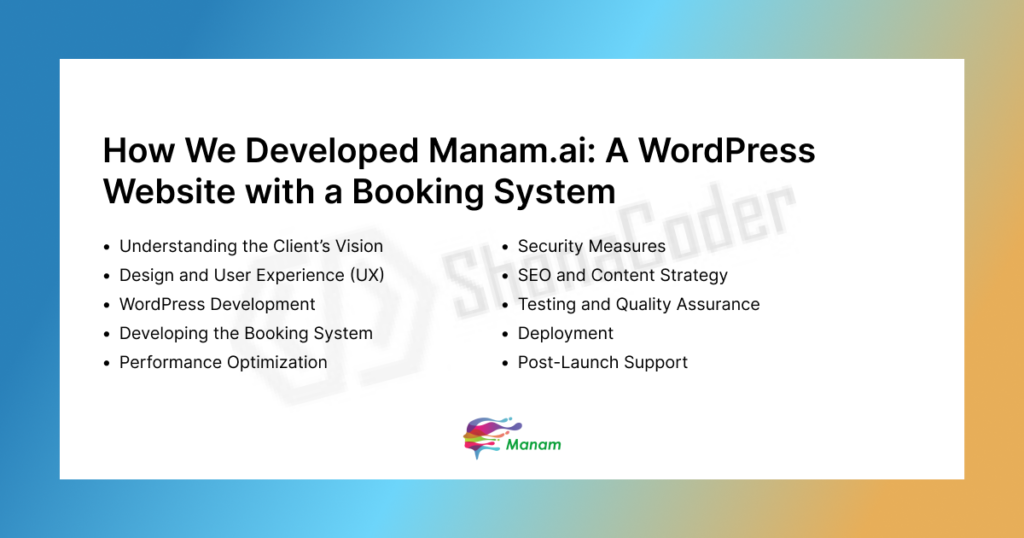Developing Manam.ai, a WordPress-based website with an integrated booking system, was a journey of innovation and collaboration. The goal was to create a user-friendly platform that showcases services while offering seamless booking functionality. Here’s how we brought this project to life step by step.
1. Understanding the Client’s Vision
Initial Consultation
We began by conducting in-depth discussions with the client to understand:
- The purpose of the website.
- The target audience and user personas.
- Specific features required, including the booking system.
Requirements Analysis
Based on these discussions, we documented:
- Functional requirements, such as service listing and real-time bookings.
- Non-functional requirements, like speed, responsiveness, and security.
2. Design and User Experience (UX)
Wireframing and Prototyping
Using tools like Figma, we:
- Created wireframes to map out the site’s structure.
- Designed a prototype to visualize the user journey and interactions.
Responsive Design
The website was designed to work flawlessly across devices:
- Desktop.
- Tablet.
- Mobile.
Accessibility Compliance
To ensure usability for all, we implemented:
- Keyboard navigation.
- Alt text for images.
- High contrast text options.
3. WordPress Development
Theme Selection and Customization
We selected a WordPress theme that aligned with the client’s vision and customized it to:
- Reflect the brand’s aesthetics.
- Accommodate the booking system and service listing.
Plugin Integration
Key plugins used include:
- Booking System Pro: For real-time bookings and calendar integration.
- Yoast SEO: To optimize content for search engines.
- WP Rocket: For performance optimization.
4. Developing the Booking System
Requirements
The booking system needed to:
- Allow users to view available time slots.
- Enable seamless booking and payment.
- Provide automated confirmation emails.
Implementation
Using Booking System Pro, we:
- Configured time slots, services, and staff availability.
- Integrated payment gateways such as PayPal and Stripe.
- Enabled calendar sync with Google Calendar for staff management.
Testing
Extensive testing ensured:
- All booking scenarios functioned correctly.
- Payments processed securely and without errors.
- Confirmation emails were delivered promptly.
5. Performance Optimization
Speed Testing
We used Google PageSpeed Insights and GTmetrix to:
- Minimize load times.
- Improve overall performance scores.
Image and Code Optimization
Steps taken include:
- Compressing images with TinyPNG.
- Minifying CSS, HTML, and JavaScript files.
Caching
With WP Rocket, we implemented caching strategies to:
- Reduce server load.
- Ensure fast page loads for returning visitors.
6. Security Measures
SSL Integration
An SSL certificate was installed to:
- Encrypt user data.
- Build trust with a secure connection.
Firewall and Malware Scans
We set up:
- A firewall to block unauthorized access.
- Regular malware scans to detect and prevent vulnerabilities.
User Role Management
Access was restricted based on user roles to:
- Prevent unauthorized changes.
- Protect sensitive data.
7. SEO and Content Strategy
Keyword Research
We identified high-value keywords relevant to the client’s services using tools like SEMrush.
On-Page Optimization
Each page was optimized with:
- Focused meta titles and descriptions.
- Proper header structure (H1, H2, H3).
- Internal linking to guide users and search engines.
Content Creation
We developed engaging content, including:
- Service descriptions.
- Blogs that address user pain points and provide solutions.
8. Testing and Quality Assurance
Functional Testing
We tested all features, including:
- Booking and payment processes.
- Navigation and responsiveness.
User Testing
Feedback from real users helped us:
- Identify pain points.
- Refine the user experience.
Cross-Browser Testing
The website was tested on:
- Chrome, Firefox, Safari, and Edge.
- Android and iOS devices.
9. Deployment
Staging Environment
Before going live, the website was deployed on a staging server to:
- Test performance under load.
- Finalize all settings.
Go-Live
After client approval, the website was launched with:
- DNS configuration for the domain.
- Monitoring tools to track uptime and performance.
10. Post-Launch Support
Training
We provided the client with:
- A detailed guide to manage bookings and content.
- Live training sessions for their team.
Ongoing Maintenance
Our support included:
- Regular updates to plugins and themes.
- Continuous performance and security monitoring.
FAQs
1. What booking system was used for Manam.ai? We integrated Booking System Pro, enabling real-time bookings, calendar sync, and secure payments.
2. How did you ensure the website’s performance? Through caching, image optimization, and minifying code, we achieved fast load times and high performance scores.
3. Is the booking system user-friendly? Yes, it offers intuitive navigation, automated confirmations, and seamless payment integration.
4. How was the website secured? Security measures included SSL encryption, firewalls, and regular malware scans.
5. What support was provided post-launch? We offered training sessions, detailed guides, and ongoing maintenance to ensure smooth operation.


